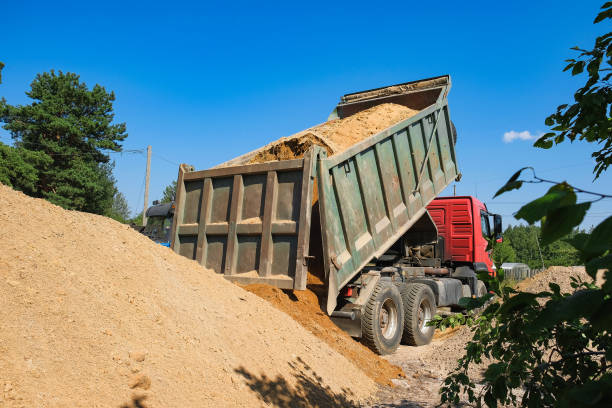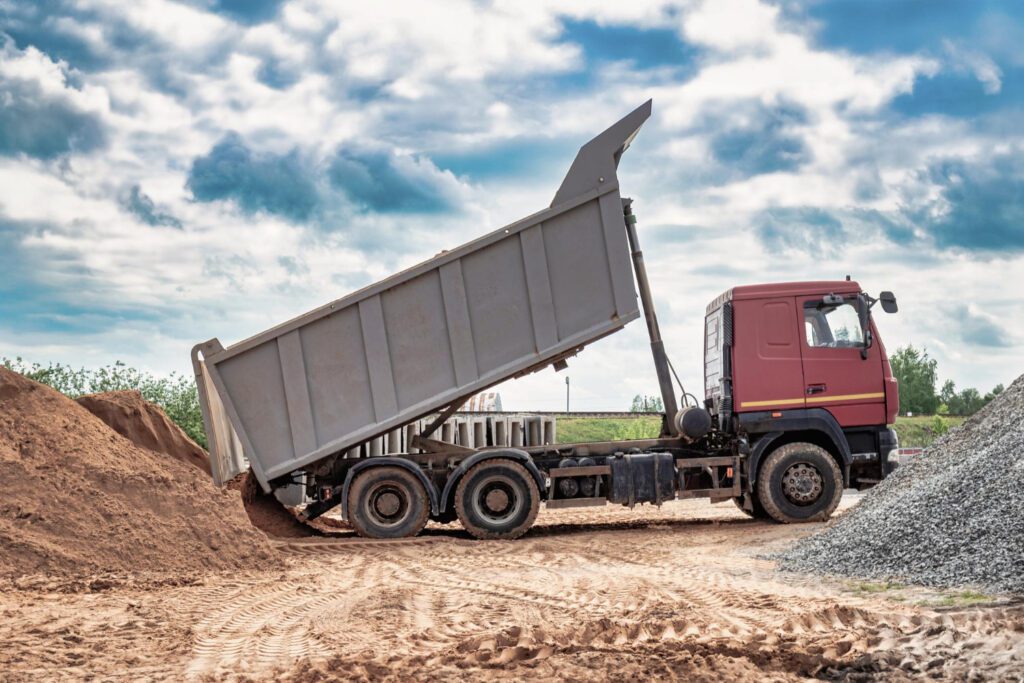Dump trucks are essential for construction and hauling, moving heavy loads efficiently. But with great power comes great responsibility—safety must be a top priority. However, operating these massive vehicles comes with significant safety challenges. Ensuring that dump truck operations are safe is vital to protect both the driver and everyone on the job site. Understanding and implementing safety measures are essential steps to prevent accidents and improve efficiency.
In the following sections, we will explore the importance of dump truck safety, essential precautions before operating a dump truck, best practices during operations, and the latest safety technologies that can enhance dump truck operations.
Understanding the Importance of Dump Truck Safety
Dump trucks are key players in many industries, but operating them safely is critical. One of the biggest risks? Tipping over. Ensuring that everyone understands the importance of dump truck safety can help prevent accidents and save lives. One of the primary dangers is the risk of tipping over, especially when the truck is carrying heavy or uneven loads. This can happen when the truck is on uneven terrain or if the load shifts suddenly during transport.
Safety is not just about protecting the driver; it’s also about ensuring the safety of everyone on the job site. A tipping truck can cause significant damage to equipment and property, and worst of all, it can injure or kill workers. For these reasons, understanding and prioritizing dump truck safety measures is essential for any project using these vehicles.
Besides the risk of tipping, dump trucks can also be involved in collisions and other accidents if not operated correctly. Proper training and adherence to safety protocols are essential to minimize these risks. Regular safety meetings and drills can help keep safety at the forefront of everyone’s mind, ensuring that these large vehicles are operated in the safest manner possible.
Essential Safety Precautions Before Operating a Dump Truck
Before hitting the road, make sure to follow these key safety checks to avoid accidents. These steps can help catch potential problems before they become serious issues.
1. Inspect the Truck: Regular inspections are crucial. Check the tires for wear and tear, and ensure they are properly inflated. Look over the hydraulic system, brakes, and lights to make sure everything is in working order. Ensure the dump bed operates smoothly, and there are no obstructions.
2. Secure the Load: Before setting off, make sure the load is evenly distributed and properly secured. An uneven load increases the risk of tipping and can shift unexpectedly during transport. Use proper restraints to keep everything in place.
3. Review Safety Protocols: Go over the safety protocols and ensure everyone involved is aware of them. This includes the driver, loaders, and anyone working in the vicinity of the dump truck. Ensure everyone knows what to do in case of an emergency.
4. Plan the Route: Know the route you will take and be aware of any potential hazards. Avoid rough or uneven terrain whenever possible, and make sure you know where you’re going to unload the truck. Planning helps reduce unexpected surprises, which can lead to accidents.
By following these essential safety precautions, you can significantly reduce the likelihood of accidents and ensure a safer working environment for everyone involved in dump truck operations.
Best Practices During Dump Truck Operations
Now that you’re up and running, here are the best practices to keep your dump truck operations safe and smooth. Following these guidelines can help ensure smooth and safe operations.
1. Follow Speed Limits: Driving at appropriate speeds is vital, especially when carrying heavy loads. Speeding increases the risk of losing control and tipping over. Always follow posted speed limits and adjust your speed based on road conditions.
2. Use Proper Signals: Clear communication is crucial when operating a dump truck. Use your turn signals, brake lights, and hazard lights as needed. This helps other drivers and workers on the site know your intentions and maintain a safe distance.
3. Be Cautious on Turns: Turns are particularly risky when operating a dump truck. Take turns slowly and avoid sharp maneuvers that could destabilize the load or tip the truck. Ensure the load is evenly distributed to minimize risk during turns.
4. Keep a Safe Distance: Maintain a safe distance from other vehicles and workers. This gives you more time to react if something unexpected happens. Avoid tailgating and be mindful of the truck’s blind spots.
5. Unload Safely: When it’s time to dump the load, ensure you’re on level ground. Slowly lift the dump bed, and keep an eye on the load as it empties. If the ground is uneven or if the load shifts, stop immediately to reassess the situation.
Safety Technologies to Enhance Dump Truck Operations
Safety technology has transformed how dump trucks operate—here’s how to use it to your advantage. Implementing these tools can help prevent accidents and improve overall efficiency.
1. Automatic Lowering Systems: These systems use sensors to detect when the truck is at risk of tipping. They automatically lower the dump bed to stabilize the truck, greatly reducing the risk of rollovers.
2. GPS Tracking: GPS technology helps drivers navigate efficiently and avoid hazardous routes. It can also be used to monitor the truck’s location in real time, ensuring it stays on safe paths.
3. Backup Cameras and Sensors: These tools provide drivers with a clear view of what’s behind the truck, making it easier to back up safely. Sensors can alert drivers to obstacles they might not see, preventing collisions.
4. Telematics Systems: These systems collect data on various aspects of the truck’s performance, including speed, braking, and load distribution. This information can be used to identify unsafe behaviors and areas where improvements are needed.
5. Tire Pressure Monitoring Systems (TPMS): TPMS continuously monitor the air pressure in tires. Proper tire pressure is critical for safe driving, and these systems alert drivers to any issues before they become serious problems.
Integrating these safety technologies into dump truck operations can help create a safer and more efficient work environment. They provide valuable data and automated responses that reduce the risk of human error.
Conclusion
Keeping your dump truck operations safe protects not only your crew but also your equipment. Following these safety tips, along with the latest tech, can make all the difference. By understanding the importance of safety, taking essential precautions before operating, following best practices during operations, and utilizing modern safety technologies, you can greatly reduce the risks associated with these heavy vehicles.
For those looking to enhance their dump truck safety further, consider exploring specialized safety equipment. At Wink Anti Tip, we offer advanced anti-tip kits designed to alert drivers and automatically lower the dump bed when necessary. Incorporating such technologies can provide an extra layer of protection, making your operations safer and more reliable.
Ready to take the next step in improving dump truck safety? Contact us today to learn more about our innovative safety solutions. Your crew’s safety is our priority.




0 Comments